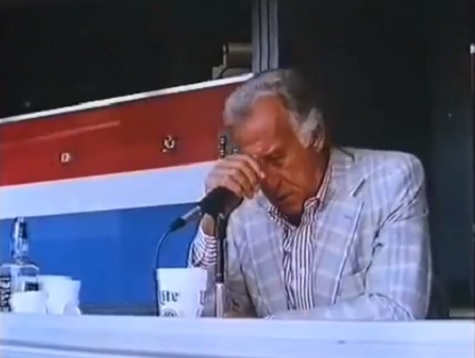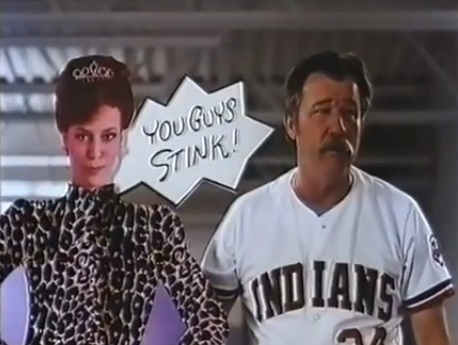In case you have never had basic cable at any point in the past 30 years, here is the plot of Major League: The new owner of the Cleveland Indians, a, uh, Major League Baseball team, tries to move the team from the banks of Lake Erie to sunny Miami; she purposefully stacks the team with bad players in order to drive down attendance and break her lease with the city, but the players find out and fight back. This is loosely based on a real story, although in a different sport — after the owner of the NFL’s Los Angeles Rams died, his widow took over the team and moved it to St. Louis — but it’s difficult to imagine that scenario being turned into a movie. The NFL has long been protective of its image and brand, not letting the ribald Semi-Tough use real teams in the ’70s and certainly not handing over precious Dallas Cowboy logos to Oliver Stone for Any Given Sunday in the late ’90s.
But Major League writer-director David S. Ward was a huge Indians fan and wrote the movie as a tribute to his team, and whoever was running MLB commissioner Peter Ueberroth’s film licensing department gave Ward the league — multiple teams besides the Indians appear (including several scenes with the hated Yankees) — and while some filming took place in Cleveland, many of the games were filmed at the Milwaukee Brewers’ stadium. The Indians’ players are raunchy and rude and for a time very shitty on the field, but presumably owners Richard and David Jacobs were OK with this because (spoiler) the team gets good, wins the division, and unites the city, all things that would ultimately provide an image boost to people who were looking to build a new stadium — at the taxpayers’ expense of course — at the time. But Jim Bouton’s Ball Four had long put to bed the idea of the classy baseball player and the movie’s Indians aren’t much different than the crude goofs of a Police Academy movie. If anything, they’re rather wholesome, no onscreen sex with sex workers and no hard drug use at all (which was all over the place in baseball at the time, see the World Champion 1986 New York Mets). I wouldn’t be surprised if the MLB required the movie to be toned down before signing off.

No, what stood out while rewatching this was how open a movie about an actual, professional sports team is about said team sucking and the evil asshole owner being the reason for this. No one would see this film as a real dig at the actual Cleveland Indians* — the wholesome happy ending makes the fantasy clear, both by not badmouthing the Indians and by not accurately representing the still-struggling team — but this still involves a powerful business letting itself be mocked and criticized, not as a point to be scored but as a matter of course. It made me think of a running gag in 1939’s Bachelor Mother, where Ginger Rogers and her fellow employees at a department store have to deal with the unwanted squawking of an annoying wind-up Donald Duck doll. I don’t think the Walt Disney Company would sign off on such a casual, obnoxious use today.
But nattering toys really are annoying, and baseball owners really are venal pieces of shit. The overall conceit of Major League, that a sports team’s ownership would purposefully field a weak squad for reasons that benefit themselves and not the players or the fans, is ingrained across all professional sports these days — you could easily argue that half of the teams comprising Major League Baseball are doing this any given season. Major League, a solid box office hit in 1989 and a cable staple ever since, is far too mainstream to be subversive but its casual shit-talking about baseball — the sport, the fans, the official, licensed exempt-from-anti-trust-law business run by people who seem to despise the game itself — is as honest as it is vulgar.
Meanwhile, the most popular baseball movie of the past decade is probably 2011’s Moneyball, which dramatizes a true story of MLB stats analysis and general managers, and a few years after that came out, the licensing-averse NFL gave its blessing to Draft Day, a football flick celebrating not the players but the people who evaluate them. Movies about signing off and approval of plans themselves, a defensive shift to neutralize putting something unpredictable in play. It’s nice to have a reminder like Major League that the league once let bloopers through the gap.
What other movies capture something real that their subjects would not sign off on or try to hide today? What movies coming out now are showing us things that won’t be cleared in the future?
*which are now the Cleveland Guardians and of course the other thing about this movie that really stands out now is the casual and accepted racism of the Indians name and imagery, accurate to the time and not ill-intentioned but rapidly approaching the the level of blackface in ’40s movies. This is something else that wouldn’t fly today.


